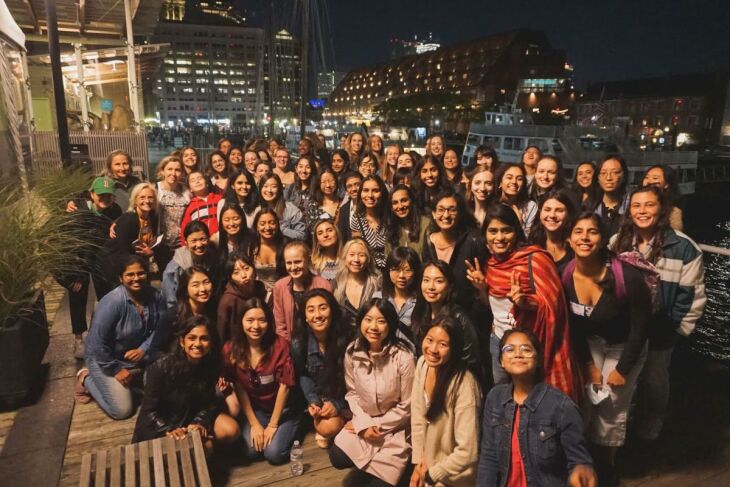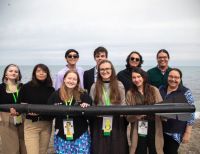The MIT Department of Electrical Engineering and Computer Science announced yesterday the Thriving Stars initiative, a new effort to improve gender representation in MIT’s largest doctoral graduate program.
“All types of representation are vital to EECS at MIT, and Thriving Stars will unify multiple disparate efforts focusing on women and other underrepresented genders,” says Asu Ozdaglar, head of the Department of Electrical Engineering and Computer Science (EECS), MIT Schwarzman College of Computing deputy dean of academics, and MathWorks Professor of EECS.
The announcement was made on Ada Lovelace Day, a worldwide event celebrating women in science, technology, engineering, and mathematics. The day is named for the 19th century British mathematician who is considered by some to be the first computer programmer for her early contributions to Charles Babbage's proposed Analytical Engine, an early computing machine. “It is particularly meaningful to announce Thriving Stars on Ada Lovelace Day, a moment when the world celebrates the achievements of women in STEM,” Ozdaglar says. “We honor the contributions of Ada Lovelace, and will continue to support women, and to achieve our goal of improving gender representation in our department and beyond.”
Addressing a critical gap
Computing and information technology are primary drivers of technological progress in the 21st century. Groundbreaking advances from electrical engineering (EE), computer science (CS), and artificial intelligence and decision-making (AI+D) are changing our day-to-day life. And yet, in all three fields, a substantial gender gap persists.
For the technology of tomorrow to meet the needs of all members of society, critical work is needed to close the gender gap in these crucial fields. With this new initiative, EECS aims to focus on increasing participation of female graduate students in the department, considering their wide-ranging influence as the scientific, technical, and policy leaders of tomorrow.
Thriving Stars will take a holistic, and concerted, approach to achieving this goal by providing support and information to students throughout every step of their PhD journey: from recruitment to admission all the way to graduation. The initiative will focus on efforts to navigate the application process and showcase research opportunities, interdisciplinary collaborations, and internships, as well as the diverse array of career opportunities accessible to doctoral EECS graduates. Thriving Stars will further strive not only to inspire women and other underrepresented genders to pursue graduate work at MIT, but also to build a more supportive and representative community for all graduate students.
MIT: Driving change
MIT EECS is uniquely positioned to make inroads to impacting gender representation in its graduate student body. Routinely ranked the top PhD program in the world, the department is an internationally recognized leader in EE, CS, and AI+D, with a long history of significant research contributions to all three fields. Importantly, the undergraduate population of EECS is steadfastly approaching gender balance (with an overall percentage of women at 42 percent), while the department is making strides toward better gender representation among the faculty and department leaders.
However, according to the National Science Foundation, only one in four doctoral degrees are awarded to women in engineering, computer science, and math, and one in three awarded in physical sciences. The situation within the graduate program at MIT EECS is no better, with female graduate students representing only 25 percent of the graduate student body. For the future of all people whose lives will be impacted by computing and information technologies, that needs to change — and MIT EECS is ideally suited to lead the way. With a pipeline full of promising and talented undergraduate women (at MIT and elsewhere); a multitude of role models; the goal of building a vibrant, supportive and inclusive community; along with strenuous effort to provide fellowship support, Thriving Stars will affect change in the PhD journey for women and underrepresented genders.
Thriving Stars road map
Thriving Stars will take a multi-pronged approach, capitalizing on the department’s strong pipeline programs and wide variety of student-led support organizations. In partnership with the MIT Summer Research Program (MSRP), the EECS Graduate Application Assistance Program (GAAP), and Undergraduate Women in EECS (WiEECS), the department will work to unveil the vast world of exciting multidisciplinary research opportunities, including paths toward PhD degrees, for undergraduates. Through collaboration with Graduate Women in Course VI (GW6) and THRIVE (Tools for Honing Resilience and Inspiring Voices of Empowerment), and with mentorship from EECS faculty and alumni, EECS is committed to making the PhD journey supportive, exciting, rewarding, and an experience where each student thrives and makes meaningful contributions to their field. Additionally, Thriving Stars will showcase the groundbreaking research conducted by women in EE, CS, and AI+D in a series of research summits guaranteed to enlighten, educate, and inspire attendees.
The Thriving Stars Advisory Board, composed of highly accomplished academics and business leaders, will be at the forefront of the department’s efforts for systemic improvement for gender representation. Those board members include:
- Maria Klawe, president of Harvey Mudd College (co-chair);
- Asu Ozdaglar, Mathworks Professor, department head of EECS, and the deputy dean for academics in the MIT Stephen A. Schwarzman College of Computing (co-chair);
- Anne Dinning, managing director of D. E. Shaw & Co.;
- Susan Dumais, technical fellow at Microsoft and director of the Microsoft Research Labs in New England, New York City, and Montreal;
- Susan Hockfield, professor of neuroscience and president emerita at MIT;
- Leslie A. Kolodziejski, graduate officer and professor of electrical engineering in EECS;
- Aude Oliva, senior research scientist at MIT and director of strategic industry engagement at the MIT Schwarzman College of Computing; and
- Songyee Yoon, chief strategy officer and president of NCSoft.
Ozdaglar adds, “EECS will embark upon a variety of engagement and community-building methods during the first year of Thriving Stars; in subsequent years, we’ll further develop and deepen our most successful best practices, building a more supportive and inclusive community for all our graduate students. We hope that Thriving Stars will generate broad enthusiasm for creating similar positive change.”
















